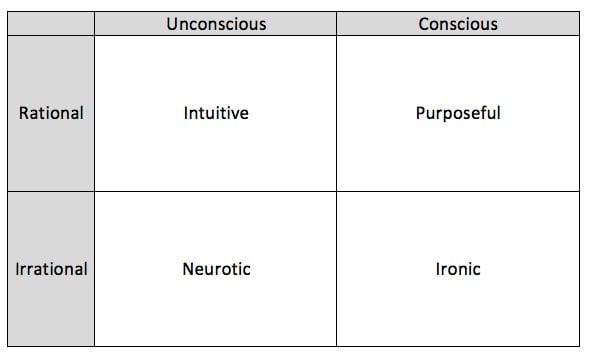Nearly every interaction you have at work can be explained by a simple anxiety matrix
We all experience garden-variety anxiety, whether in one’s private life or at the office. What’s not universal is the way we process it, or if we’re even aware of it, and whether we bother to examine our response to it.


We all experience garden-variety anxiety, whether in one’s private life or at the office. What’s not universal is the way we process it, or if we’re even aware of it, and whether we bother to examine our response to it.
For those who want to understand how anxiety plays into their work and careers, Julian Humphreys, an executive coach and therapist in Toronto, Canada, recently offered a self-styled and handy matrix, published on Psychology Today. It looks like this:

To find your square, first ask yourself how often you’re aware of feeling a sense of dread, or whether your anxiety itself may be hidden in some dark corner of your mind. Next, determine whether the concern is rational (your metrics have dropped, for instance, or you’ve just received troubling feedback) or baseless.
According to Humphreys, answering these two questions in combination will point to what’s happening in many of the interactions you have around the office. Intuitive personalities, as he labels them, are not consciously aware of rational anxieties that can trigger a pattern of possibly damaging behavior.
Neurotic types are likewise not tuned into their own inner fears, which would be recognized as unfounded, were they recognized at all.
The ironic can plainly see their own irrational angst, which they might deal with through self-deprecating behavior, a strategy that can become self-limiting, Humphreys suggests.
Finally, the purposeful type will notice when they’re feeling concerned about totally rational problems. For obvious reasons, these are the people who deal with anxiety at work directly and most fruitfully.
If you can’t find your home on the matrix, fear not. We also live in different squares or bounce between them on different days or in various contexts, says Humphreys. Besides, therapists exist to help people investigate all the triggers they’re blind to. What matters most is your improved self-awareness.